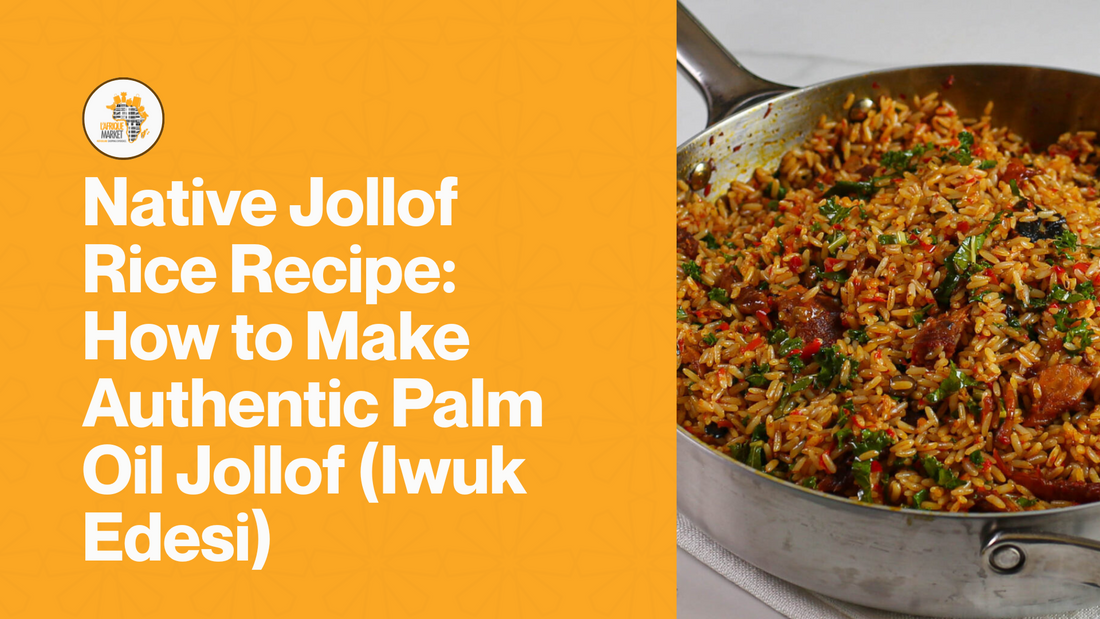
Native Jollof Rice Recipe: How to Make Authentic Palm Oil Jollof (Iwuk Edesi)
Share
Native Jollof Rice, known as Iwuk Edesi among the Efik people of Cross River State, Nigeria, represents the true essence of West African cuisine. Unlike the popular tomato-based party Jollof, this traditional palm oil Jollof rice delivers deep, smoky flavors that connect you to Nigeria's culinary roots. This ancient recipe has been passed down through generations, embodying the authentic taste of home-cooked Nigerian meals.
What is Native Jollof Rice?
Native Jollof Rice is the original version of Nigeria's beloved rice dish, predating the modern tomato-based variations. This traditional palm oil Jollof showcases the rich, earthy flavors of indigenous Nigerian ingredients like palm oil, crayfish, locust beans (iru), and smoked fish. The result is a deeply flavorful and aromatic rice dish that captures the essence of traditional Nigerian cuisine.

Image from: Cooking with Ijey
The Cultural Significance of Iwuk Edesi
Among the Efik people of southeastern Nigeria, Iwuk Edesi holds special cultural importance. This native Jollof rice represents more than just a meal, it's a connection to ancestral cooking methods, community gatherings, and the preservation of traditional flavors. The dish embodies the soul of Nigerian cuisine, offering a taste experience that modern variations simply cannot replicate.
Essential Ingredients for Authentic Native Jollof Rice
Core Ingredients:
- 2 cups long-grain parboiled rice (the foundation)
- 1/2 cup red palm oil (provides signature color and flavor)
- 1/2 cup ground crayfish (adds umami depth)
- 1/2 cup yellow onions (chopped for aromatics)
- 4 cups meat or fish stock (or seasoned water)
Traditional Protein Components:
- 1/2 cup smoked fish (pre-soaked and flaked)
- 1/2 cup stockfish (soaked and shredded)
- 1/2 cup pomo (cow skin) (diced for texture)
Authentic Nigerian Seasonings:
- 2 tablespoons locust beans (iru) (fermented for umami)
- 1 tablespoon ground pepper (or Nigerian chili)
- 2 seasoning cubes (Maggi or Knorr)
- Salt to taste
- Optional: ground uziza (for extra complexity)
Step-by-Step Native Jollof Rice Recipe
Preparation Phase (20 minutes)
- Prepare proteins: Soak stockfish and smoked fish in warm water for 15 minutes. Clean and dice pomo.
- Rinse rice: Wash parboiled rice until water runs clear.
- Parboil rice: Cook rice in salted water until 70% done, then drain and set aside.
Cooking Method (30 minutes)
- Heat palm oil: In a large, heavy-bottomed pot, gently warm palm oil over medium heat. Don't let it bleach—just warm enough to release its rich aroma.
- Build flavor base: Add chopped onions to the warm palm oil and sauté until translucent (3-4 minutes).
- Add aromatics: Stir in ground crayfish and locust beans (iru). Let these traditional ingredients marry for 2-3 minutes, releasing their distinctive flavors.
- Incorporate proteins: Add diced pomo, flaked smoked fish, and ground pepper. Stir well to distribute evenly.
- Create the cooking liquid: Pour in your stock and season with cubes and salt. Bring to a gentle simmer.
- Add rice: Carefully fold in the parboiled rice, ensuring even distribution.
- Slow cook: Reduce heat to low, cover tightly, and cook for 20-25 minutes until liquid is absorbed and rice is tender.
- Rest and fluff: Remove from heat, let rest for 5 minutes, then gently fluff with a fork.
Traditional Cooking Techniques for Authentic Flavor
The Firewood Advantage
For the most authentic native Jollof rice experience, traditional cooking methods make a significant difference:

Image from: Newsday Zimbabwe
- Charcoal or firewood cooking imparts a subtle smoky flavor
- Clay pots enhance the earthy taste profile
- Slow, even heat allows flavors to develop properly
Palm Oil Preparation
The key to perfect native Jollof lies in proper palm oil handling:
- Use unrefined red palm oil for authentic color and flavor
- Don't overheat the oil—gentle warming preserves nutritional value
- Quality matters—source authentic African palm oil for best results
Advanced Flavor Enhancement Tips
Traditional Additions:
- Snails: Add cleaned, chopped snails for authentic texture
- Periwinkles: Include these sea snails for coastal authenticity
- Uziza seeds: Ground uziza adds distinctive peppery notes
- Bitter leaves: A few leaves enhance the traditional flavor profile
Cooking Secrets:
- Low and slow: Never rush the cooking process
- Tight seal: Ensure the pot is tightly covered to trap steam
- Minimal stirring: Preserve rice grain integrity
- Resting time: Allow flavors to settle before serving
Nutritional Benefits of Native Jollof Rice
Native Jollof rice offers exceptional nutritional value:
- Red palm oil provides vitamin A and antioxidants
- Crayfish delivers protein and essential minerals
- Smoked fish adds omega-3 fatty acids
- Locust beans contribute probiotics and protein
- Complex carbohydrates from rice provide sustained energy
Perfect Pairings for Native Jollof Rice
Traditional Accompaniments:
- Fried plantains (dodo) - sweet balance to savory rice
- Hard-boiled eggs - protein complement
- Grilled tilapia or catfish - authentic Nigerian pairing
- Steamed vegetables - nutritional balance
- Nigerian pepper sauce - for heat lovers

Image from: KikiFoodies
Beverage Pairings:
- Palm wine - a traditional fermented drink
- Zobo (hibiscus tea) - refreshing herbal option
- Fresh coconut water - natural and cooling
- Nigerian beer - modern accompaniment

Image from: The Guardian
Regional Variations of Native Jollof Rice
Efik Style (Cross River):
- Emphasis on seafood and palm oil
- Inclusion of periwinkles and snails
- Use of uziza for spicing
Rivers State Version:
- Higher proportion of smoked fish
- Addition of bitter leaves
- More intense palm oil flavor
Akwa Ibom Style:
- Incorporation of local vegetables
- Use of dried fish varieties
- Subtle heat levels
Where to Source Authentic Ingredients
Creating authentic native Jollof rice requires genuine Nigerian ingredients. L'Afrique Market specializes in providing high-quality West African ingredients essential for traditional cooking:
- Premium red palm oil - unrefined and authentic
- Ground crayfish - freshly processed
- Locust beans (iru) - properly fermented
- Smoked fish and stockfish - traditional preservation methods
- Nigerian seasonings - authentic flavor profiles
- Uziza and other traditional spices - hard-to-find ingredients
Common Mistakes to Avoid
- Using refined palm oil: This lacks the authentic flavor and color
- Overcooking the rice: Results in mushy texture
- Rushing the process: Flavors need time to develop
- Skipping the iru: Locust beans are essential for authentic taste
- Using too much liquid: Creates soggy rice
- High heat cooking: Burns the palm oil and ruins the flavor
Storage and Reheating Guidelines
Storage Tips:
- Refrigerate for up to 3 days in airtight containers
- Freeze for up to 1 month in portion-sized containers
- Cool completely before storing
Reheating Methods:
- Stovetop: Add a splash of stock and warm gently
- Steamer: Maintains moisture and texture
- Avoid microwave: It can make rice mushy
Health Considerations and Dietary Adaptations
Nutritional Highlights:
- High in antioxidants from palm oil
- Rich in protein from fish and crayfish
- Good source of minerals from traditional ingredients
- Complex carbohydrates for sustained energy
Dietary Modifications:
- Vegetarian version: Replace fish with mushrooms and vegetable stock
- Lower sodium: Use less salt and seasoning cubes
- Gluten-free: Naturally gluten-free when using pure ingredients
Conclusion: Embracing Culinary Heritage
Native Jollof Rice represents more than a recipe—it's a celebration of Nigerian culinary heritage. This traditional palm oil Jollof connects us to ancestral cooking methods while delivering unparalleled flavor and nutrition. The deep, smoky taste of authentic Iwuk Edesi cannot be replicated by modern shortcuts or substitutions.
By using traditional ingredients and time-honored techniques, you're not just cooking a meal—you're preserving culture and creating memories that span generations. The rich, earthy flavors of native Jollof rice remind us why traditional cooking methods have endured for centuries.
Ready to experience authentic Nigerian flavors? Visit L'Afrique Market for all your traditional ingredients. From premium palm oil to ground crayfish and locust beans, L'Afrique Market ensures your native Jollof rice captures the true essence of Nigerian cuisine.
